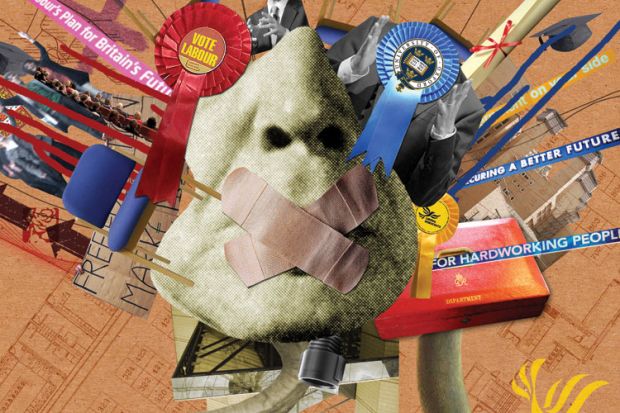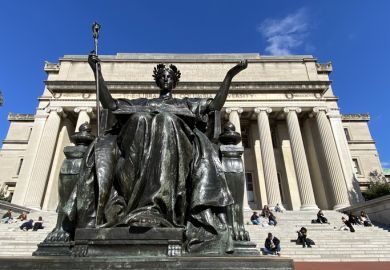Source: Miles Cole
For the parliamentary party the conference is an annual inconvenience at which they must come face-to-face with fanatical party members
“To every thing there is a season,” says the book of Ecclesiastes. Early autumn in the UK is the season for party political conferences. This year, the Conservatives were in Birmingham, Labour went to Manchester and the Liberal Democrats decamped to Glasgow. I decided to visit the annual gatherings of the three main parties in the hope that there might be something to learn about their plans for higher education. As it turns out, a party conference is the last place to go to hear anything new about higher education policy, but they have much to tell about the nature of party politics.
The quarrelsome party conference was once the place where policy was thrashed out and manifesto commitments were forged. After years of image-conscious party leaders dreading the headline of “an embarrassing defeat for the leadership at conference”, all this has passed into history. Policymaking is now outsourced to thinktanks and agreed at weekend retreats with the leader’s team. The main hall is now simply a stage for trumpeting achievements.
Policy discussion now takes place almost exclusively at fringe events. However, like the Edinburgh Festival, the “fringe” is not as outré as it once was. Fringe events can cost thousands of pounds to organise. This will buy 90 minutes of floor time in a packed itinerary, with up to 20 sessions running in parallel. Next, you will need a media partner such as a national newspaper or a thinktank such as ResPublica that will be running events all week and can take on the organisational burden for you. The more expensive your partner, the greater the likelihood of hosting your session in a room on the main conference site, rather than in a hotel 10 minutes’ walk away. Finally, you will need to invite some speakers of interest to the conference. An MP is a necessity while a spokesperson or minister is highly desirable. A respected policy wonk may provide meaningful content, while a well-known journalist (preferably one paid to have controversial opinions to a deadline every week) will help to fill the room.
For party members, some of them fanatically devoted to the cause (those who knock on doors, run tombolas and take minutes in branch meetings), the annual conference is their chance to hold the parliamentary party to account. For the parliamentary party the conference is an annual inconvenience at which they must come face-to-face with fanatical party members.
The turnout at the average fringe session consists of about one-third journalists waiting to tweet any ministerial slip-up, one-third party apparatchiks waiting to spin to the rescue when the minister slips up, and one-third party members posing questions that are all treated as potential traps by the unhappy minister. The special advisers and party staff, who know how fruitless these events are, would all rather be back in Westminster getting on with their day jobs. The journalists, who are experienced enough to know that nothing meaningful will be said, spend the time wondering how they are going to embellish the minister’s bland comments and come up with a 300-word news story. The chair of the panel is often a broadcaster or journalist “phoning in” on a topic marginal to their interests. The only people who seem to be enjoying themselves are the few party members lucky enough to be chosen to ask a question. When they get their chance, they invariably take full advantage of their moment with the microphone and have to be cut off by the chair mid-flow.
The sessions at conferences are generic. Each year the National Union of Students and Million+ organise the same event at every conference (“A New Deal for Students and Universities: Will the Conservatives/Labour/the Liberal Democrats Deliver?”). This year, Policy Exchange organised higher education events in Birmingham and Manchester, the Social Market Foundation was at all three and Bright Blue added to the agenda in Birmingham at a fringe meeting co-hosted with Universities UK and London First. UUK also held private dinners in Manchester and Birmingham, presumably deeming this a cost-effective way to lobby decision makers.
A lot of existential angst is dissipated in the evenings at party conferences by people worrying about whether they are at the right social event, wondering if the dinners organised by the University Alliance, the Higher Education Policy Institute, the Quality Assurance Agency and GuildHE have more stellar guest lists than those arranged by UUK or the Russell Group. Anyone who attends such meetings is already a professional eater on behalf of their university or organisation, and the quality of the dining experience is seldom determined by the actual food on offer. Just as policy development would be better served by not bothering with the fringe event, so the business of conference dinners could be more efficiently advanced in the complete absence of food.
The true nerve centre of the conference, of course, is the bar at the conference hotel, which by 1am of the second day is as crowded as a rush-hour train on the Tokyo underground. This is where party activists have their moment mingling with the front bench, stepping over the likes of Andrew Neil and Allegra Stratton on their way to order eye-wateringly expensive (even by London standards) drinks. Despite what health officials might suggest, the cost of alcohol seems to be no barrier to consumption. The conference hotel is “the Westminster bubble” transported along the motorway network. It is ring-fenced by staff from G4S who check accreditation with a rigour directly related to the danger posed by the groups the party leader has annoyed that year. If it is this difficult to obtain a drink under Ed Miliband, how tough must it have been under Tony Blair?
Conference season traditionally starts with the Liberal Democrats but their trip to the Scottish Exhibition and Conference Centre had to be rescheduled, first because of the referendum and then because of a caravan exhibition (or so I am told). So this year Labour was first out of the blocks. The conference was not quite the car crash it might have been had the vote in Scotland gone the other way. With Labour ahead in the polls at the time and favourite with the bookies to form the next government, the last conference before a general election should have been an occasion to rally the troops in preparation for a return to power. However, after a close-run referendum, the mood was a mixture of exhaustion and relief.

In Clark we have an accidental minister with little interest in higher education who will probably be out of office in eight months’ time
It should also have been the conference at which Labour set out its promise on funding for higher education. However, so soon after a reprieve for the Union, higher education was well down the list of priorities for Labour. At the NUS and SMF fringe events, shadow universities, skills and science minister Liam Byrne was repeatedly asked about any pledge on £6,000 tuition fees. Each time he skilfully dodged having to make a commitment. “The policy is in development…There will be a pledge in the election manifesto…Higher education will be central to the offer Labour puts to the electorate…But we will not make promises we cannot afford.” The reality is that Labour will wait until the chancellor’s Autumn Statement to better understand the possible state of public finances during a first year in office before undertaking their own comprehensive spending review in 2015. Once in government, it is much easier to shuffle Whitehall spreadsheets in order to make the sort of borrowing that the student loan book requires appear to be a long-term issue for some future administration.
If Labour higher education policy is characterised by a spokesman under instructions not to speak about higher education, then Conservative Party policy is now embodied in a minister who considers himself only marginally connected to universities. While the taciturn Byrne made several appearances at higher education-related fringe events in Manchester, Birmingham was noticeable for the almost total absence of the new universities and science minister, Greg Clark. At a fringe meeting on the first day of the conference, Clark was introduced by the chair as the “minister for cities and delivering devolution; he’s also now taken on responsibility for universities but his passion is cities”. Clark nodded and is reported to have said: “It’s really by accident universities have got involved in LEPs [local enterprise partnerships] and my cities initiatives.”
When Clark eventually made it to a higher education event, popping by the NUS/Million+ session, he offered the blinding insight that most universities “are called after their place”. So we have an accidental minister with little interest in higher education who will probably be out of office in eight months’ time. The sector can decide for itself whether this is good or bad news. In contrast, former universities and science minister David Willetts made numerous appearances in Birmingham as part of his extended farewell tour. It is highly likely that along with consulting Chris Lockwood, the US editor of The Economist on secondment to the No 10 Policy Unit, the party will turn to the knowledgeable Willetts to frame their manifesto commitment.
Discussion of higher education in Birmingham was even less illuminating than in Manchester. Most of the Conservative Party think of the NUS as the sort of proscribed organisation that the G4S guards outside the conference hotel should be alert to. A breathtaking performance by The Times journalist Jenni Russell at the UUK/Bright Blue event – she claimed that many non-Oxbridge universities are “not teaching anybody anything” – summed up the general lack of knowledge among participants of anything other than the Oxford PPE syllabus. Given that the combined income of UK universities is greater than that of the fourth-largest corporation in the FTSE 100, it is surprising that there is so little curiosity among Conservatives about higher education outside Oxbridge.
My visit to the Lib Dems was more memorable for the time I spent on a replacement bus service between Carlisle and Preston than for the two scheduled higher education policy events. Business secretary Vince Cable spoke along with the Nick Hillman, chief executive of Hepi and former special adviser to Willetts, on the topic “Has the Coalition Given Universities a Strong Foundation for the Future?” Unsurprisingly, given that they were in charge of the coalition’s policy, they thought that it had. Meanwhile, Megan Dunn, vice-president for higher education at the NUS, and Julian Huppert – the Cambridge MP and poster boy for the 2010 “solemn pledge” on fees – sat on a panel that asked: “Will the Liberal Democrats deliver for students?” To be fair, Huppert did vote against the rise. Nonetheless, it was all a bit awkward.
While a party conference is anthropologically similar to an academic conference, with its keynotes and breakout sessions, poster displays, book fairs and late-night networking, political conferences differ from academic ones in their requirement to revolve around the leader’s speech. The speeches I witnessed this year, only months away from a general election, all had one thing in common: they were all designed to shore up the core vote of each party. It would seem that none of the parties is taking the risk of trying to win the election by reaching out to potential swing voters in the middle ground. Even though conference democracy has been nullified and political party membership has been in decline in the UK for the past 20 years (with the recent exception of the post-referendum surge in membership for the Scottish National Party), it seems that pleasing the party faithful is more important than ever.
In Manchester, much of Ed Miliband’s speech involved anecdotes about “ordinary” people called Beatrice and Helen that he had met on his walks on Hampstead Heath. This was designed to make the fratricidal career politician and son of a London School of Economics political science professor seem ordinary. As others have observed, it had the opposite effect, making one wonder why the Labour Party leader made such a habit of talking to random strangers in the park. At the end of his speech he left the stage for a walkabout to shake hands with members of the audience. Towards the end of his excursion he took a wrong turn and started to climb the stairs of the press balcony. Seated at the end of a row, I suddenly realised that he was heading straight towards me, followed by a BBC camera crew. I knew then how Beatrice and Helen must have felt (“Oh no, Ed Miliband is coming over…Pretend you haven’t noticed him!”). Fortunately, two steps shy of my row, he turned back and waved to the crowds before exiting the hall. My journalistic objectivity and academic detachment preserved, I later pondered the allegorical significance of this moment. Is the moral of the story that politicians will always come up short against lofty academic positions, or is it that academics should set their horizons lower if they want to get in on the political picture? Either way, as Ecclesiastes 3:5 tells us, “There is a time to embrace and a time to refrain from embracing.” This was one such time.

Mixed messages: what the politicians said about higher education
At the conferences, Labour’s Liam Byrne said that his party faced a “big debate” on its tuition fees policy over the coming months, while the Tories warned that a Labour £6,000 fee policy would be a “huge step backwards”.
On 22 September, Byrne, the shadow universities, science and skills minister, told a Labour fringe meeting that Ed Balls’ speech had made it clear that “we are not going to make promises that we cannot afford, and we are not going to make promises that we cannot keep”.
But he did say that Labour want to lower the cost of tuition and that if that was done, the party would promise to “make good” any resulting falls in income for universities. Labour’s policy would be in the manifesto, but “obviously my goal is to set it out as early as we can before then”. Pressed on whether Labour might announce their fees policy after the Autumn Statement, which is scheduled for 3 December, Byrne said: “It’s going to be tough to do it before then.”
Meanwhile, Greg Clark, the universities and science minister, said that a policy of £6,000 fees would create a “fiscal black hole”. On 30 September, during his sole appearance at a higher education fringe meeting, he also refused to support proposals to remove overseas students from the net migration target. Clark, who arrived late and left early, claimed that there had been a “curious absence of any real discussion of higher education and universities at the Labour Party Conference, which I think is extraordinary this far before an election”.
At the Liberal Democrat conference, Vince Cable, the business secretary, criticised the Conservatives by warning that their “absolutely absurd” net migration target was discouraging overseas students from coming to UK universities. He also admitted that the education provided by some private providers amounted to “a lot of dross”.
“What we have done is opened the door to private sector alternative providers, including for-profit companies. Some of these have been very good, really outstanding, innovative institutions.
“But there’s a lot of dross and some of those operations are providing cheap and cheerful courses, recruiting students who then get maximum grant…We’ve had to crack down on them pretty hard because there was some immigration abuse taking place in them,” he said.
And the business secretary claimed that the Conservatives could raise fees “significantly” and abolish student grants if they win power at the election. The next government “will have to face” calls from the universities of Oxford and Cambridge to raise fees to about £15,000, Cable added.
Times Higher Education reporters
Register to continue
Why register?
- Registration is free and only takes a moment
- Once registered, you can read 3 articles a month
- Sign up for our newsletter
Subscribe
Or subscribe for unlimited access to:
- Unlimited access to news, views, insights & reviews
- Digital editions
- Digital access to THE’s university and college rankings analysis
Already registered or a current subscriber? Login





